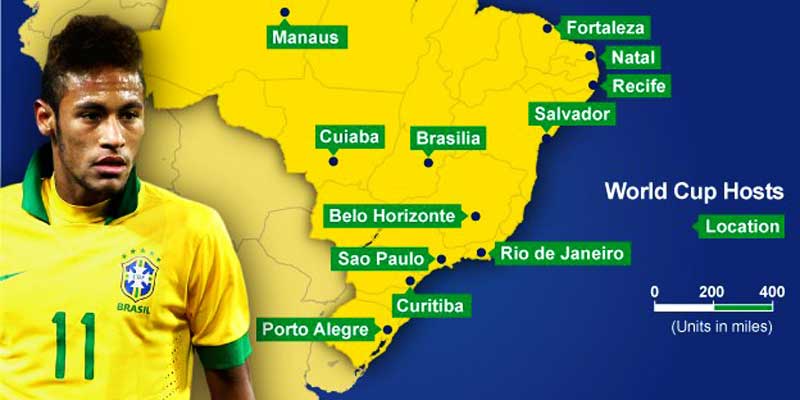With the World Cup just hours away from kick-off, the hosts Brazil are in full swing to give some final touches to the stadiums that will host 32 countries from across the globe.
With the World Cup just hours away from kick-off, the hosts Brazil are in full swing to give some final touches to the stadiums that will host 32 countries from across the globe. With a host of controversies and delays behind it, here are the 12 stadiums from Brazil and its schedule of games that comes along with it:
Arena De Sao Paulo, Sao Paulo
Capacity: 65,807
Fixtures: 12 June, Brazil v Croatia; 19 June, Uruguay v England; 23 June, Netherlands v Chile; 26 June, South Korea v Belgium; 1 July, Second-round, Winner Group F v Runner-up Group E; 9 July, Semi-final, Winner Quarter-final 3 v Winner Quarter-final 4.
The home of the famous Brazilian club, Sao Paulo FC, the city’s stadium will host a number of big games that includes the semi-final. However controversy marred during the construction of the stadium when three workers died. Two were killed when a crane collapsed in November 2013, and another died in March 2014 after falling from a stand.
Estadio Mineirao, Belo Horizonte
Capacity: 57,400
Fixtures: 14 June, Colombia v Greece; 21 June, Argentina v Iran; 24 June, Costa Rica v England; 17 June, Belgium v Algeria; 28 June, Second-round, Winner Group A v Runner-up Group B; 8 July, Semi-final, Winner Quarter-final 1 v Winner Quarter-final 2.
This stadium was built in three years cost around 695 million Brazilian reais (£185m). Estadio Mineirao is one of Brazil’s national monuments. Moreover, besides the FIFA World Cup, it will also host football matches during the 2016 Olympics.
Estadio Castelao, Fortaleza
Capacity: 58,000
Fixtures: 14 June, Uruguay v Costa Rica; 17 June, Brazil v Mexico; 21 June, Germany v Ghana 24 June, Greece v Ivory Coast; 29 June, Second-round, Winner Group B v Runner-up Group A; 4 July, Quarter-final, Winner Second-round 1 v Winner Second-round 2.
The Estadio Castelao was completed on time thus was the first stadium to be declared ready for the FIFA World Cup. Its work began in March 2011 and cost was around 518m reais (approx £167m). The city of Fortaleza sits on Brazil’s north-east coast and is a popular tourist destination because of its beaches.
Estadio Do Maracana, Rio de Janeiro
Capacity: 76,804
Fixtures: 15 June, Argentina v Bosnia-Herzegovina; 18 June, Spain v Chile; 22 June, Belgium v Russia; 25 June, Ecuador v France; 28 June, Second-round, Winner Group C v Runner-up Group D; 4 July, Quarter-final, Winner Second-round 5 v Winner Second-round 6; 13 July, World Cup final.
One of the key venues in this year’s World Cup Finals, the Estadio Do Maracana was completed just last year. The stadium formally reopened on 2 June when it hosted the friendly game between Brazil and England and also three Confederations Cup matches. Rio is famous for its beaches, Cristo Redentor (the famous Jesus Christ statue) and also the football clubs- Flamengo, Fluminense, Botafago and Vasco da Gama. Also, the Maracana will also be hosting the football games at the 2016 Olympics and which also includes the opening and the closing ceremonies.
Estadio Nacional, Brasilia
Capacity: 68,009
Fixtures: 15 June, Switzerland v Ecuador; 19 June, Colombia v Ivory Coast; 23 June, Cameroon v Brazil; 26 June, Portugal v Ghana; 30 June, Second-round, Winner Group E v Runner-up Group F; 5 July, Quarter-final, Winner Second-round 7 v Winner Second-round 8; 12 July, Third-place match.
At over two billion reais (£535m), the Estadio Nacional was the most expensive stadium to be built in Brazil’s World Cup venues and reportedly the second costliest football venue ever built. It will host seven games – the joint most along with the Maracana.
Arena Pernambuco, Recife
Capacity: 42,800
Fixtures: 15 June, Ivory Coast v Japan; 20 June, Italy v Costa Rica; 23 June; Croatia v Mexico; 26 June, United States v Germany; 29 June, Second-round, Winner Group D v Runner-up Group C.
Even though the local area homes to the economically deprived residents, the stadium was built on the outskirts of Recife and will give part to a leisure complex and residential development which it is hoped will act as a medium for local renewal in the residents.
Arena Fonte Nova, Salvador
Capacity: 48,747
Fixtures: 13 June, Spain v Netherlands; 16 June, Germany v Portugal; 20 June, Switzerland v France; 25 June, Bosnia-Herzegovina v Iran; 1 July, Second-round, Winner Group H v Runner-up Group G; 5 July, Quarter-final, Winner Second-round 3 v Winner Second-round 4.
The Arena Fonte Nova took 32 months to construct and was the third World Cup venue to be completed and cost 592m reais (approx £160m). The stadium’s characteristic is its unusual horse-shoe design.
Estadio Pantanal, Cuiaba
Capacity: 42,968
Fixtures: 13 June, Chile v Australia; 17 June, Russia v South Korea; 21 June, Nigeria v Bosnia-Herzegovina; 24 June, Japan v Colombia
One of the smallest World Cup venues, the Estadio Pantanal is home to two lower league teams, Cuiaba and Mixto which play in the third and fourth tiers of Brazilian football respectively. Controversies have been part and parcel of the stadiums in Brazil and the one included this too where a worker died after being electrocuted during the installation of a communications network.
Estadio Da Baixada, Curitiba
Capacity: 41,456
Fixtures: 16 June, Iran v Nigeria; 20 June, Honduras v Ecuador; 23 June, Australia v Spain; 26 June, Algeria v Russia.
The Estadio Da Baixada was originally built in 1914 and thus could be said to be the ‘oldest’ venue at the World Cup this year. Due to its rich heritage and history, this stadium is widely regarded as one of the most modern stadiums in Brazil.
Estadio Amazonia, Manaus
Capacity: 42,374
Fixtures: 14 June, England v Italy; 18 June, Cameroon v Croatia; 22 June, United States v Portugal; 25 June, Honduras v Switzerland.
Manaus is located in the heart of the rainforest area and thus, during reconstruction, many materials arrived here by either plane or ship. Also, the teams playing here will have to fight off the climate as the temperatures can sear upto 30C.
Estadio Das Dunas, Natal
Capacity: 42,086
Fixtures: 13 June, Mexico v Cameroon; 16 June, Ghana v United States; 19 June, Japan v Greece; 24 June, Italy v Uruguay
The Estadio Das Dunas was built over the ‘Machadao stadium’ that was demolished in 2011. The stadium’s first match was a local match derby between ABC and America in January 2014.
Estadio Beira-Rio, Porto Alegre
Capacity: 48,849
Fixtures: 15 June, France v Honduras; 18 June, Australia v Netherlands; 22 June, South Korea v Algeria; 25 June, Nigeria v Argentina; 30 June, Second-round, Winner Group G v Runner-up Group H.
Originally known as the Estadio Jose Pinheiro Borda, the stadium was built in 1969 but since then, has been revamped for the FIFA World Cup 2014.
With all the formalities completed and ready to go, what are we waiting for, let the games begin! Get ready for some samba and football!





